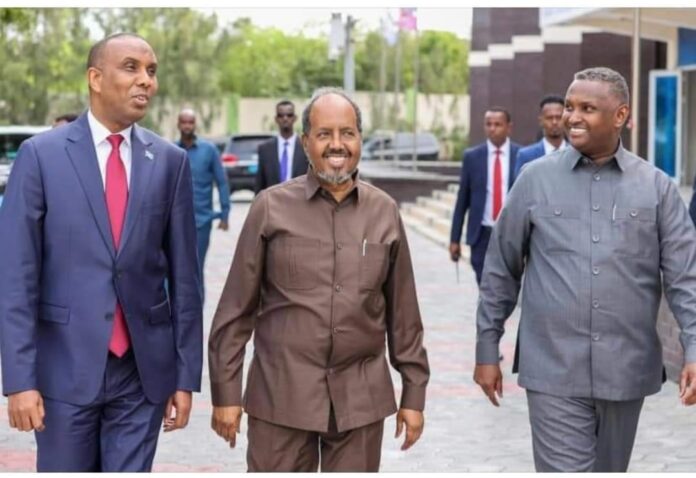Can Somalia build a modern government?
The Somali government still faces security, political, and socio-economic challenges, including addressing issues such as clan divisions, corruption, and the lack of basic services.
Many experts think that they are many tools including modern system of governance be can put in use in reshaping Somali way of governance and AI technologies.
It is evident that numerous African countries have been grappling with developmental challenges for many years and have struggled to modernize their governance structures.
Countries like Sudan and Niger, as indicated by recent information, are likely candidates facing similar experiences of prolonged civil unrest.
However, in the case of Somalia, there is a unique opportunity to capitalize on the support provided by international partners, including AU forces, which have allowed the Somali government the space needed to establish its own institutions.
These partners are prepared to assist Somalia in resuming its responsibilities and advancing its development.
(The AU forces, which have been the backbone of supporting the government, will be withdrawing soon, and UNSC has given the Somali government the opportunity to prove itself and take full control of the country.)
Is it possible for the current government to bring about the necessary changes and create a modern government in Somalia within 12 months, which can serve the country and reform its institutions?
The decision to withdraw ATMIS by December 2024 indicates a gradual transition of security responsibilities to the Somali National Army and police. The progress achieved should ideally facilitate this transition.
However, the success of Somali government will largely depend on the readiness and capacity of the Somali security forces to effectively maintain peace and security in the absence of AU force and rapid development will follow.
Somali government should adapt to keep up with the changing governance in several ways:
Somalia is anticipated to assume full responsibility for governing the entire country without external support and that is a big responsibility.
Experts suggest to the current leadership that only a modern government equipped with individuals well-versed in the art of statecraft can effectively assume this role, not the current set up inherited from incompetent previous administration.
With 75% of the Somali population being young and a significant portion of them unemployed, it becomes clear that the traditional methods of governance are unable to address this issue.
As a result, Somali politicians are left with no alternative but to completely transform the way Somalia is governed. This transformation would require substantial investment from the government, focusing on job creation across various sectors such as fisheries, agriculture, and modern livestock management. Here are some important idea to be explored and thoroughly:
Foster inclusivity and citizen participation:
With the rise of social media and online platforms, citizens are becoming more empowered and engaged in political discourse. Governments should embrace this trend by actively seeking input from citizens through public consultations, crowdsourcing ideas, and involving them in decision-making processes. This not only enhances transparency but also ensures that policies and initiatives meet the needs and expectations of the people the government serves.
Prioritize sustainability and resilience:
Given the environmental challenges Somalia is facing, governments need to prioritize sustainability and resilience in their policies and practices. This includes investing in renewable energy, promoting green initiatives, and adopting sustainable development goals. Governments should also invest in disaster preparedness and response systems to mitigate the impact of natural disasters and other crises.
Promote accountability and transparency:
The changing world requires governments to be more accountable and transparent in their actions. Governments should adopt measures to prevent corruption, enhance transparency in decision-making processes, and ensure the responsible and ethical use of public funds. This builds trust among citizens and fosters a positive relationship between the government and the governed.
Embrace technology:
The advancement of technology has changed the way we communicate, conduct business, and interact with each other. Governments should leverage technology to improve efficiency and effectiveness in delivering services to citizens. This includes digitalizing administrative processes, implementing e-governance platforms, and adopting emerging technologies such as artificial intelligence.
Strengthen international collaboration:
The globalized world demands greater cooperation and collaboration between nations. Governments should actively engage in international forums, partnerships, and agreements to address global challenges such as climate change, terrorism, and pandemics. By working together, governments can pool resources, knowledge, and expertise to find collective solutions to shared problems.
In conclusion, modern governance needs to adapt by embracing technology, fostering inclusivity, prioritizing sustainability, strengthening international collaboration, and promoting accountability and transparency.
By doing so, governments can effectively address the challenges and opportunities presented by a rapidly changing environment. Ultimately, measuring a good governance efforts is complex and subject to different interpretations.
While some progress has been made, the long-term sustainability of peace and development in Somalia will require a comprehensive approach that addresses the root causes of conflict and the government requires to promote good governance and addresses the socio-economic needs of the Somali people.
The end.
Mohamed Mohamud Adde
An academic and Political Analyst.


